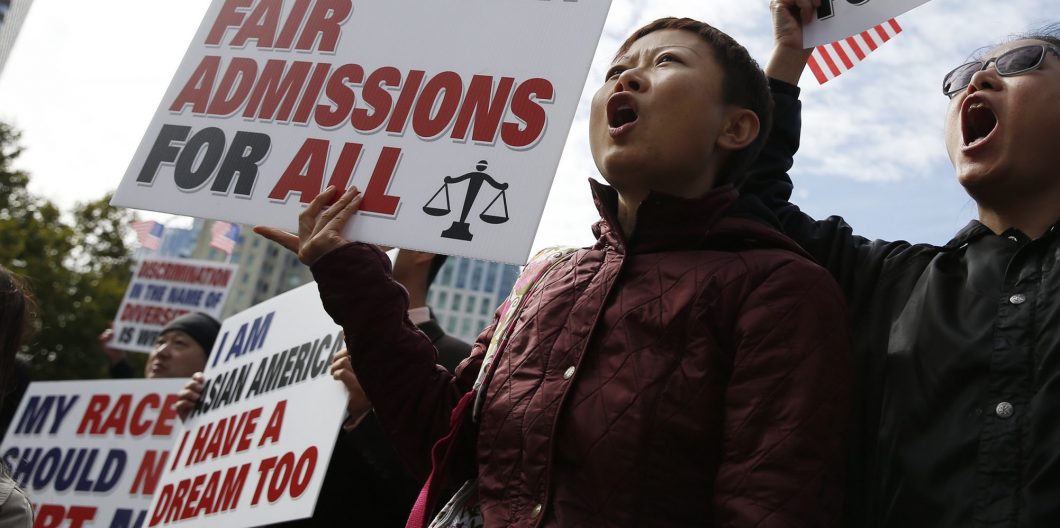Harvard officials insist that the university does not engage in racial balancing, but their own admissions statistics prove otherwise.
Will Asian-Americans Rise to Equality?
An Inconvenient Minority: The Ivy League Admissions Cases and the Attack on Asian-American Excellence establishes Kenny Xu as an authoritative source for understanding and meeting today’s diversity, equity, and inclusion (DEI) challenge. Xu, President of Color Us United and a journalist, reorients the fierce exchanges over race through his scholarship and shrewd insights. Despite its subtitle, the book does not belabor the Harvard case with its now notorious statistical disparities reflecting discriminatory treatment of Asian-American applicants.
Rather, Xu deftly weaves together well-chosen anecdotes and statistical data to capture the collision between the DEI bulldozer and Asian-American aspirations and achievements in education and employment. He makes clear how woke elite policies hamper the lives of all Americans in their pursuit of happiness. And he adds the astounding arguments of Asian-Americans who have supported the elites against other Asian-Americans. Xu admonishes Asian-Americans to not remain passive spectators to the blows they have been dealt but instead enter the political arena and fight for their rights and all whose rights the strange new god of DEI has trampled.
Xu exhorts Asian-Americans to “rise to equality” (as Lincoln put it) from their embattled position. In rejecting a contrary version of identity politics, he is on the path to discovering Lincoln, whose guidance will free Asian-Americans to enjoy the blessings and accept the burdens of liberty. Xu provides not only an enlightening account of a major contemporary political and legal issue but a self-discovery of his own soul.
But let’s go back to Harvard and the case on which Xu himself advised. To put the Harvard case in a nutshell, Xu uses the facts brought out from the case to shed light on the creation of an Asian-American stereotype in employment, society, and high school that levels their prospects. He reminds the reader of the history of Asians in America. But he does not draw the proper conclusion from the exclusion of ethnic Japanese from the west coast during World War II. There surely were an undetermined number of ethnic Japanese, mostly among the immigrants to be sure, who favored Japanese victory. He needed to look more closely into the reasonable suspicions authorities had of that mistreated minority. The ethnic threat here today is not from a war with China but from covert appeals to commit industrial espionage.
In all these tensions, Asian-Americans have posed a problem for white elites—the Progressives who run Harvard are the leading example of the mentality of the administrative state. First, “Asian” is an artifice, covering peoples from the Far East westward to somewhere in the Middle East or lately to Afghanistan, with borders drawn by different bureaucrats at different times. The category has political usefulness to the left and to bureaucrats, as its size makes it more worthy of government funding and notice (It would be politically unwise to speak only of, say, China.).
Of course, the artificial label brushes over the historic conflicts among the different Asian peoples (as today different Asian nationalities commit a sizeable number of hate crimes against other Asians—consider inter-ethnic tensions between different nationalities) and the vast economic and other disparities among different Asian immigrant groups. Xu points out that there is more income inequality among Asians than there is among blacks. Often he really means Chinese, when he says Asian, though he might accommodate other East Asians in his discussions.
While Asian discipline and work ethic may elicit initial admiration, the approval halts and nativism arises when “little Johnny, son of the Prius-driving, Whole Foods-buying, leafy liberal couple down the block” loses scholarships and admissions “to guys named Wong and Xu. Some black legislators and spokespersons were more blunt about “suspiciously high number of Asians” in magnet schools and denounced some “privilege” these foreigners allegedly possessed, as they took over “their” schools. In the campaign to repeal California’s constitutional provision forbidding racial preferences in state programs, including university admissions, an Hispanic assemblywoman denounced Asian-American opposition to preferences saying “This makes me feel like I want to punch the next Asian person I see in the face.” Evidently, some blacks took the initiative to do so.
This is the pattern of jealousy, suspicion, and exclusion Xu sees in universities, Silicon Valley, and society overall. Unlike other immigrants who took jobs that other Americans shunned, Asian-Americans went for the jobs that promised riches—from gold mining to high tech. Moreover, he underscores some Asian-American intellectuals’ criticism of rising Asian-American admissions to selective schools, e.g., Iris Kuo, who writes of the “whitening of Asian-Americans.” Because they quite absurdly claim that Asian-Americans share “white privilege,” they join an oppressor majority that keeps blacks and Hispanics down. These elitist Asian-Americans are vocal and teach at Harvard Law School and write in white privileged journals such as the New Yorker. Of course, I add, that none of these Asian-American writers will admit that the decried actual violence against Asian-Americans is in a plurality of cases committed by blacks.
But when political figures falsely impute the violence to whites, they promote racist actions among all groups, thus increasing the chance for violence among all races and ethnicities. In collaborating with such dishonesty pushed by white liberals, Asian-American elites show their malignity toward not only Asians but to all Americans. Xu appropriately dismisses them as “self-flagellating Asians,” but, to draw out his argument, the morality they model is even more destructive than personal: they are as un-American as the worst elite whites.
Xu paints a dismal picture of overt DEI discrimination against Asian-American children in the recent reductions in their admission to selective public high schools. These include New York public high schools and Thomas Jefferson and Alexandria high schools in northern Virginia, not to mention private schools. Xu provides nauseating details from a New York Mayor DiBlasio political rally led by woke Asians toward Asian-American protestors against the city’s reduction of Asian enrollment at selective public high schools. The Mayor’s Asian-American allies were able to choke out their ability to protest.
Thus, when Xu calls for “a coherent political identity” for Asian-Americans, he should have seen how vacuous a wish this is—unless he means a full-hearted identification with the Declaration of Independence. That’s the strongest source in principle and in history that ties immigrants to America, as Lincoln noted. Asians, as earlier Irish, French, and Germans, have become part of an “electric cord,” connecting themselves with the Founders. Lincoln’s definition of slavery, “You work, and I eat,” still functions today. To wish for an Asian-American political identity is to acknowledge the anti-American drivel of the woke Asian-Americans who want to promote black political identity and other class-based privileged identities. To reaffirm the Declaration: every American owns himself and therewith the honoring of equality as the fundamental political principle uniting the country.
Xu exhorts Asian-Americans to “rise to equality” (as Lincoln put it) from their embattled position. In rejecting a contrary version of identity politics, he is on the path to discovering Lincoln, whose guidance will free Asian-Americans to enjoy the blessings and accept the burdens of liberty.
But Americans are not isolated individuals. Here Xu touches on a sensitive point—the manhood of Asian men. With a high racial intermarriage rate, Asian-American women in particular benefit from the rise in class status. These exotic flowers suffer different stereotypes than men, which partly accounts for the far higher interracial marriage rates of Asian-American women. Asian men, despite their high incomes, rank with black women as the least desirable choices on dating sites. To President Biden, the winner of the Masters golf tournament is a “Japanese boy.” That insult sums up the view of Asian men from the Woke.
We can only speculate about the consequences this has for the admission of Asians to elite undergraduate schools. Perish the thought that white women would find undesirable fewer white men (and more Asians) as classmates. Would that give Asian women an edge over Asian men? Xu leads us up to the brink of asking such sexist questions that demand an unwoke understandings of human nature. Harvard would just as soon accuse Chinese-Americans of being more likely to commit espionage than those of other backgrounds—not that patriotism ranks high on the list of desirable admissions qualities.
In his moving portrayals of meritorious but frustrated Asian-American male applicants, Xu pulls together his insights and sees the delusions Asian-Americans have created for themselves. Some of them consciously write admissions essays against their stereotypes (a practice common among applicants of all backgrounds). However, Xu’s own story is a more convincing conversion to see the truth. He does finally realize that Harvard, and the whole Ivy League, is really an oligarchy, far from Jefferson’s “natural aristocracy.” He has rediscovered the administrative state and how America’s new ruling class has distorted ordinary citizens’ lives.
Xu takes risks in his writing. For example, what does he mean by wanting Asian-Americans to learn from the late 19th–century California anti-Chinese demagogue Denis Kearney (“The Chinese must go”)? How do you beat a racial demagogue? Or start with this reality: “Silicon Valley runs on Asians,” that is, on software engineers, who, however, are blocked from upper management. Contrary to the cliché that “diversity is our strength,” Xu believes that our excellence is our strength. Thus he dismisses as “intellectual gaslighting” of the McKinsey study, “Why Diversity Matters,” among such others, that are hostile to Asian-American interests.
Contrary to some of his rhetoric, Xu is not arguing for a variant of racial class stratification. He is urging his readers to think more radically. For Xu the key question is this: “Will Asian-Americans be able to define themselves in the American narrative—or will they let Leftists and identity-politics peddlers do it for them?” The latter alternative will doom Asian-Americans to a dismal life of servitude to an elite with Asian-Americans having earned a middling place in the administrative state. But the former is either atomistic or burdened by its own racial identity problems, as he already admitted “Asian” is an artificial term.
Kenny Xu has produced a book packed with wisdom and street smarts, a remarkable achievement for any writer, and especially for a young journalist just two years out of college. To extend the trajectory of his argument a bit more: The Founders opposed open borders because they didn’t want the new republic to be overwhelmed by aliens who came from anti-republican regimes. For their part, some foreigners argued America corrupted its immigrants. One Frenchman even claimed the American air deformed dogs, who lost their capacity to bark,(Federalist 11). In a sense this is true: Once humans learn to breathe free, we lose what we had mistaken for our human essence, that is, our conventions from other nations, and come to know our humanity, our natural right. Human beings of alien nationalities may bark barbarously, but their essence is not their language but their logos. We become American not through something “in the air ” or in the environment but through the American Word. In this way, being born anew, Americans can “vindicate the honor of the human race” and teach Africa and Asia, as Alexander Hamilton noted, American greatness: its exotic but somehow “self-evident truth” that “all men are created equal.”


